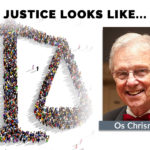EDITOR’S NOTE: “Justice looks like …” is a special series in the Voices column. Readers will have the opportunity to consider justice from numerous viewpoints. The series is based on each writer’s understanding of Scripture and relationship with Jesus Christ. Writers present their own views independent of any institution, unless otherwise noted in their bios.
You are encouraged to listen to each writer without prejudgment. Then, engage in conversation with others around you about what justice looks like to you.
Click here for more information about the series. Click here to read the full “Justice looks like…” series.
I did not expect to become a mortgage loan originator when I finished my Master of Business Administration degree, and it was not a direct path I took to become one. But I enjoy the work, and I am grateful.
Working in this role, I am required to do annual training about fair lending and equal credit opportunity. For many years, I have been trained to be aware of, and to avoid, discriminatory actions that result in disparate treatment or disparate impact on people of color.
Our training often has introductory comments about the legislation mandating fair lending or equal credit opportunity, but it usually omits any historical detail about the events that led up to the laws being changed.
History of unfair lending and unequal credit
These courses do not talk about property restrictions that were common for many years, stating a property could be used by “white persons only”—or how the federal government intentionally imposed racial segregation through housing policy.
They don’t explain that home mortgages with subsidized interest rates were readily available to veterans after World War II, unless the veteran was Black.
Nor do they teach about many desirable financing options being available to white homebuyers, while systematically being denied too often to equally qualified Black or brown Americans.
Sign up for our weekly edition and get all our headlines in your inbox on Thursdays
Sadly, this is the history of home financing and home ownership in America.
I have learned these details from reading, discussions at the workplace, and recently, as I have been a part of conversations prompted by headlines of current injustices. It is not usually the story of an isolated incident of long-ago injustice, but rather the widespread and current injustices that have caught my attention.
Today, thankfully, we have much more just laws governing housing finance. How much work is left to be done to make homeownership equitable for all people is a worthy topic for another time. My current thoughts are about these histories and the generative conversations that are possible when we, who are followers of Christ, are learning, growing and working for change.
“Fat and sleek”
In discussions with family, friends and business associates that have filled these days of working from home and masking up to go out, I have listened to many varying perspectives around race, opportunity, privilege and responsibility.
Some comments have pierced my heart with doubt and sadness, but increasingly, I hear words that lift my heart with hope. I remember in my prayers all the things I have heard, and I mull them over repeatedly as I read Scripture.
In Jeremiah 5:28, the prophet tells us that the people of Judah “… have grown fat and sleek. They know no limits in deeds of wickedness; they do not judge with justice the cause of the orphan, to make it prosper, and they do not defend the rights of the needy.”
In the days before the pandemic, the stock market reached new highs and the economy looked unstoppable. Is that our “fat and sleek?” Maybe. I know what looked unstoppable in February 2020 when the Dow Jones hit 29,569 very quickly looked brittle and weak for a while after. So, can we really take comfort in the new higher highs?
For those willing to see, the pandemic has laid bare the fact that we too often lose sight of the orphan’s cause and the rights of the needy. In our consumer-driven economy, we are being consumed by our own desires for ever-increasing levels of safety and prosperity. We want to claim our own rights but shift responsibility to others.
“Where is God leading in this?”
It is in these days of sickness, protest, strife and division, when fear and doubt so easily could overwhelm, I am encouraged by the fresh conversations I hear—dialogues where differing views are expressed and greater understanding results. I sense God’s movement in people seeking opportunities to hear what they have not heard and see what before they have not seen.
What is it we, who seek the kingdom of God, will do to right the injustices around us? Will we love our neighbor as ourselves by welcoming into our neighborhood those who do not look like us?
At the end of 2019, when I thought about 2020, I sure didn’t foresee all that happened. When 2021 arrived, I sure hoped and prayed for better days. Through it all, I didn’t expect to learn about and discuss the history of injustice in my own line of work. But I am still learning.
Where is God leading in this? I can’t say for sure, but I know I have work left to do, and I am grateful for a new perspective on a job I already loved.
Ed Francis is a loan officer and sales manager in the mortgage department of a Texas-based community bank. He and his family are longtime members of Wilshire Baptist Church in Dallas. The views expressed are those solely of the author.
Click here to read the full “Justice looks like…” series.














We seek to connect God’s story and God’s people around the world. To learn more about God’s story, click here.
Send comments and feedback to Eric Black, our editor. For comments to be published, please specify “letter to the editor.” Maximum length for publication is 300 words.